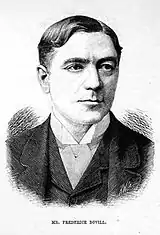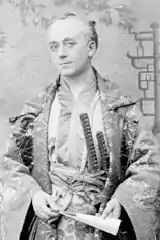Frederick Bovill
Frederick Bovill was an operatic baritone of the late Victorian era. In his short career, he created the roles of Pish-Tush in Gilbert and Sullivan's comic opera hit The Mikado (1885) and the Squire in Sullivan's romantic opera Ivanhoe (1891). From 1887 to 1889 Bovill toured the British provinces with J. W. Turner's English Opera Company

Life and career
Nothing is known of Bovill's life; the musicologist Kurt Gänzl found that his dates are consistent with a fish sauce and pickle merchant of the same name from Harrow, London, but that person consistently identified his career as "merchant" during the period when Bovill was professionally engaged in opera.[1]
The Mikado

In the original production of The Mikado at London's Savoy Theatre (1885–1887), Bovill joined the D'Oyly Carte Opera Company, where he originated the supporting role of the Japanese nobleman Pish-Tush.[2] As part of the role, it was intended that Bovill should sing the bottom line in the madrigal "Brightly dawns our wedding day", which includes a bottom F. Bovill, however, was unable to produce this note with sufficient sonority, so shortly after the opera premiered, the character of Go-To, another "Noble Lord", was created to sing the bass line in this number (and to speak an introductory line of dialogue); Rudolph Lewis was cast in this role, while Bovill continued to play the rest of the role of Pish-Tush throughout the run.[3]
The critic of the Illustrated Sporting and Dramatic News commented: "Mr. Frederick Bouvill (sic) is a trifle heavy as Pish Tush, but has a very good voice and knows how to make use of it". The Theatre stated: "Mr. Bovill (the other recruit) proved an excellent representative of the "general utility" noble Lord, Pish-Tush. This gentleman possesses a fine mellow voice, which he produces very agreeably, and is in all respects an acquisition to the Savoy company.[4] In another review later in the run of the show, the Illustrated Sporting and Dramatic News said, "Mr. Frederic Bovill cannot boast a very long professional career. After some experience as an amateur he made his debut in The Mikado, taking the part of the Noble Lord Pish-Tush. Without a very great deal to do, he makes the best of his part, and his excellent voice and artistic singing are heard to advantage."[5]
Later roles

In Gilbert and Sullivan's next production, Ruddigore, there was only one principal lyric baritone role in the cast, and Bovill was released from the D'Oyly Carte Opera Company.[6] From 1887 to 1889 Bovill was on a tour of the British provinces with J. W. Turner's English Opera Company as Danny Mann in The Lily of Killarney, Count Arnheim in The Bohemian Girl, Don José de Santarém in Maritana and as Count di Luna in Il trovatore, appearing at Her Majesty's Theatre in Dundee, the York Theatre Royal and the Theatre Royal in Oldham among other venues.[7][8][9] The critic of The Evening Telegraph in Dundee said of Bovill's performance in Maritana:
"He has undoubtedly a baritone voice of excellent timbre and is a pleasing and effective actor, but he deliberately destroys all pleasure the ear should derive from his voice by a persistent tremolo that is most annoying to listen to. If it is a natural defect no more need be said; if it is done for effect it is decidedly bad taste."[10]
In The Stage in 1889 he advertised himself as: "Mr. Frederick Bovill. Principal Baritone, Grand Opera. Count di Luna, Valentine, Count Arnheim, Don José de Satiterun, Don Pedro, Danny Mann, &c. Mr. N. Vert, Cork-street, W."[11] In 1891 Bovill again created a role in an Arthur Sullivan opera, the Squire in Ivanhoe, at the new Royal English Opera House.[2][12]
His final sustained role on the London stage was the Chancellor in La Basoche by André Messager (November 1891 to January 1892) at the Royal English Opera House,[2] In May 1892 he took part in a recital at the Steinway Hall in London during which he sang "Time was when Love and I were well acquainted" from The Sorcerer and "Ho, Jolly Jenkin" from Ivanhoe, the latter being encored.[1][13] He played Tom Ball in a single matinee performance of the operetta A Hundred Years Ago by Alec Nelson at the Royalty Theatre in July 1892. The critic of The Era said of him in this, "Mr Frederick Bovill acted and sang with all the ease and certainty of intonation that are expected from so experienced an artist."[14]
In the film Topsy-Turvy (1999) he was portrayed by Michael Simkins.[15]
References
- Gänzl, Kurt. "The third wish: or, Pish Tush Bah!", Kurt Gänzl's blog, 26 April 2018
- Stone, David. "Frederick Bovill", Who Was Who in the D'Oyly Carte Opera Company, 27 August 2001, accessed 24 May 2018
- Ainger, Michael. Gilbert and Sullivan: A Dual Biography, Oxford University Press (2002), p. 245
- "Our Musical-Box", The Theatre, 1 April 1885, pp. 186–190
- Illustrated Sporting and Dramatic News, 4 July 1885, p. 4
- "Dramatic Gossip", West Coast Times, Issue 6416, 14 February 1887, p. 2
- "English Opera Company in York", The York Herald, 31 January 1888, p. 6
- "Amusements in Oldham", The Era, 23 March 1889, p. 20
- "Amusements in Barnsley", The Era, 27 April 1889, p. 22
- "Maritana at Her Majesty's Theatre", The Evening Telegraph, Dundee, 1 November 1887, p. 2
- The Stage, Friday 12 July 1889, p.3
- Wearing, J. P. The London Stage 1890–1899: A Calendar of Productions, Performers, and Personnel, Scarecrow Press (2013), p. 91
- "Mr Skeet's Recital", The Era, 14 May 1892, p. 18
- "A Hundred Years Ago", The Era, 23 July 1892, p. 13
- Simkins, Michael. "Michael Simkins", Gilbert and Sullivan Society of Sussex], January 2014